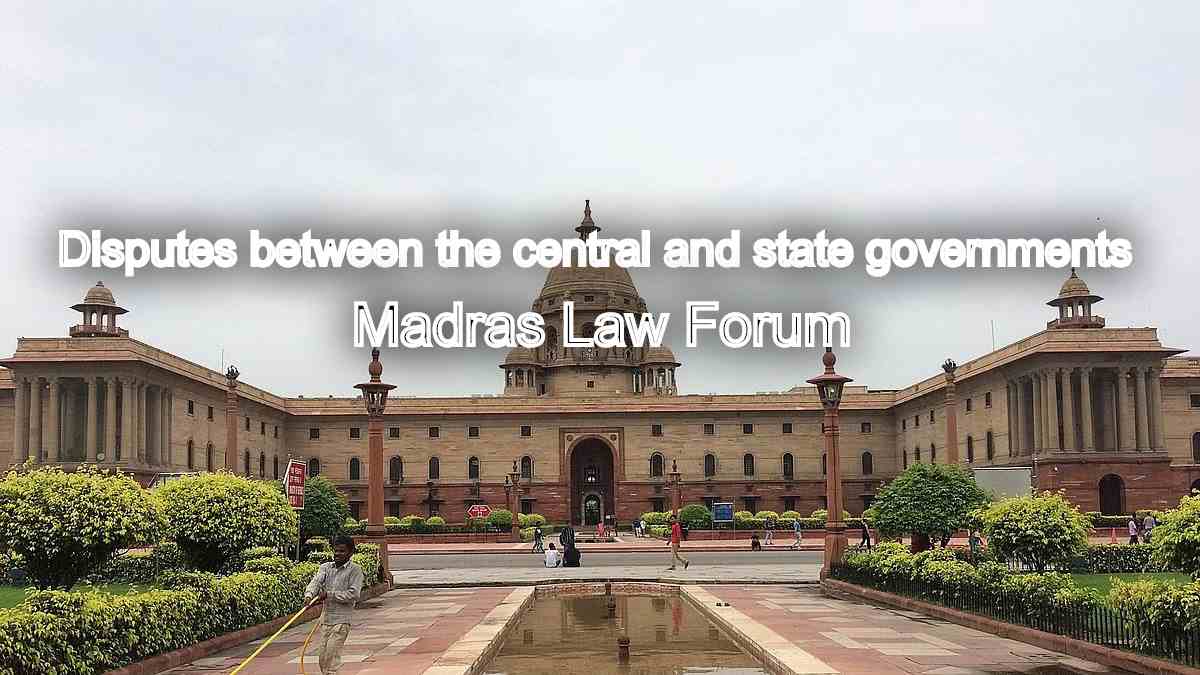How are disputes between resolved: India, a federal republic, is a complex mosaic of states and a central government. This intricate balance of power often leads to disputes between the two. However, the Constitution of India provides a robust framework to resolve these intergovernmental conflicts, ensuring the smooth functioning of the federal system.
How are Disputes Between the Central and State Governments Resolved Under Constitutional Law : Madras Law Forum
The Constitutional Framework for Resolving Intergovernmental Disputes
The Constitution of India outlines several mechanisms to address disputes between the Centre and the States. These mechanisms are designed to maintain a harmonious relationship between the two levels of government.
Judicial Review
One of the most potent tools for resolving intergovernmental disputes is judicial review. The Supreme Court of India, as the apex court, has the power to interpret the Constitution and declare any law or action of the Centre or a State unconstitutional. This power allows the Court to intervene and settle disputes that arise from conflicting interpretations of the Constitution or laws.
Original Jurisdiction of the Supreme Court
The Supreme Court of India has original jurisdiction to adjudicate certain types of disputes between the Centre and the States. This includes disputes involving the interpretation of the Constitution, treaties, agreements, and international treaties. By exercising its original jurisdiction, the Supreme Court can directly address and resolve intergovernmental conflicts.
Inter-State Water Disputes
Inter-state water disputes are a common source of conflict between states. The Constitution provides for the adjudication of such disputes through the establishment of tribunals. The Inter-State Water Disputes Act, 1956, empowers the Central Government to set up tribunals to resolve water disputes between states. These tribunals have the power to adjudicate on issues such as water sharing, dam construction, and irrigation projects.
Centre-State Financial Relations
The Constitution governs the distribution of financial resources between the Centre and the States. The Finance Commission, a constitutional body, is responsible for recommending the sharing of taxes between the Centre and the States. Disputes related to the distribution of financial resources can be addressed through judicial review or by approaching the Finance Commission.
Administrative Mechanisms
In addition to judicial and quasi-judicial mechanisms, there are various administrative mechanisms to resolve intergovernmental disputes. These include inter-state councils, zonal councils, and ministerial committees. These bodies provide platforms for dialogue and negotiation between the Centre and the States, enabling them to resolve disputes amicably.
FAQs: How are Disputes Between the Central and State Governments Resolved Under Constitutional Law?
The Supreme Court of India plays a crucial role in resolving inter-state disputes. It has the power of judicial review, which allows it to examine the constitutionality of laws and actions of the Centre and the States.
The Inter-State Water Disputes Act, 1956, typically resolves inter-state water disputes. This Act empowers the Central Government to set up tribunals to adjudicate on water-sharing issues between states.
The Finance Commission is a constitutional body responsible for recommending the sharing of taxes between the Centre and the States. It plays a crucial role in resolving financial disputes by ensuring equitable distribution of resources.
In addition to judicial and quasi-judicial mechanisms, there are various administrative mechanisms to resolve inter-state disputes. These include:
Inter-State Councils: These councils provide a platform for the Centre and the States to discuss and resolve issues of common interest.
Zonal Councils: These councils facilitate coordination and cooperation among states within a particular zone.
Ministerial Committees: The government forms these committees to address specific inter-state issues and recommend solutions.
The Indian Constitution establishes a federal system that balances the powers of the Centre and the States. It provides for a division of powers, with certain subjects being exclusively within the domain of the Centre and others within the domain of the States. Additionally, the Constitution establishes mechanisms to resolve inter-state disputes, safeguarding the interests of both the central and state governments.
Conclusion
The Indian Constitution has established a comprehensive framework for resolving intergovernmental disputes. Through a combination of judicial review, legislative measures, and administrative mechanisms, the Constitution ensures a balance of power between the Centre and the States. By effectively addressing these disputes, the Constitution promotes federalism and strengthens the unity of the nation.
Read More
- Are there any alternative dispute resolution mechanisms available for civil cases in India? Expert Advice
- Can individuals seek remedies through international human rights mechanisms?
- Can the Constitution of India be amended to infringe upon fundamental rights?
- Can the Constitution of India be amended to alter the basic structure of the Constitution?
- How are disputes resolved between shareholders or directors under corporate law?
- Ministry of Law and Justice:
